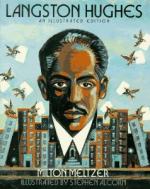
|
| Name: _________________________ | Period: ___________________ |
This test consists of 15 multiple choice questions and 5 short answer questions.
Multiple Choice Questions
1. What does Langston think about his father?
(a) He misses him.
(b) He never wants to see him again.
(c) He should write to him soon.
(d) He wonders what he is up to.
2. When he returned to Harlem in January of 1938, what does Langston do?
(a) He protests the war.
(b) He runs the Harlem Suitcase Theater.
(c) He helps build a theater for blacks called the Harlem Suitcase Theater.
(d) He writes a play.
3. Who is Jesse B. Simple?
(a) Langston's best friend.
(b) One of Langston's characters.
(c) A member of the Black Renaissance that Langston had met.
(d) A character in one of Langston's poems.
4. With what is Hughes' poetry often infused?
(a) Anti-American propaganda.
(b) African American propaganda.
(c) Political or religious propaganda.
(d) Communist propaganda.
5. About what is Hughes to report?
(a) African Americans and their role in the war in Spain.
(b) The roles of Americcan soldiers in World War II.
(c) African Americans and their role in World War II.
(d) The roles of American soldiers in the war in Spain.
6. How does this person feel about Langston's poem, "Goodbye Christ?"
(a) She is excited about it.
(b) She is saddened by it.
(c) She is slightly nervous about it.
(d) She is angered and appalled by it.
7. Which of Hughes' works is published during this summer?
(a) A House in Taos and Not Without Laughter.
(b) Prodigal Son and Mulatto.
(c) Prodigal Son and Not Without Laughter.
(d) Mulatto and A House in Taos.
8. Why does Langston become depressed?
(a) He is still treated unequally.
(b) Racism he witnesses even in the midst of disaster.
(c) Racism is stronger now than a few years ago.
(d) He is treated worse in the south than in the north.
9. Who gives Langston a thousand dollar grant?
(a) Mary McLeod Bethune.
(b) His father.
(c) The member of the Black Renaissance.
(d) The Rosenwood Fund.
10. The result of Hughes' time spent writing in this place is what?
(a) A book of short stories.
(b) A play.
(c) A book of poetry.
(d) An autobiography.
11. For how long does "Don't You Want to Be Free?" run?
(a) Two hundred and twenty-five consecutive performances.
(b) One hundred and thirty-five consecutive performances.
(c) Nintey-five consecutive performances.
(d) One hundred and fifteen consecutive performances.
12. What do Langston and Zell Ingram, a friend from Cleveland, decide to do?
(a) Travel to the South.
(b) Travel to California.
(c) Travel to Asia.
(d) Travel to Paris.
13. Where does this trip south take Langston?
(a) To unversities and concert halls.
(b) To colleges, high schools, and local meeting places.
(c) To famous theaters.
(d) To community centers and high schools.
14. How is "The Big Sea" received by many critics?
(a) Angrily.
(b) Not at all.
(c) Warmly.
(d) Only slightly.
15. How does Hughes become involved with anti-war campaigns?
(a) Speaking to people at rallies.
(b) Writing advertisements for billboards.
(c) Writing and handing out pamphlets to the public.
(d) Advertisements for the radio.
Short Answer Questions
1. How does Hughes find the script, which was written by a Russian?
2. After his first year at Lincoln, where does Hughes rent a room for the summer?
3. Why does Hughes ask for a loan from Knopf, his publisher?
4. Where are Hughes' plays performed?
5. Is Langston interested in teaching after he has graduated college?
|
This section contains 579 words (approx. 2 pages at 300 words per page) |

|




